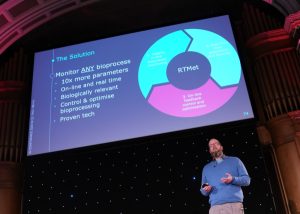
The University of Edinburgh Venture Builder Incubator is helping the team at Mean Analytics - Karl Burgess, Luke Johnston and Bart Pander - to commercialise its bioprocess optimisation technology. We talked to Bart Pander about the team's experience on the programme.
Cells can be used as tiny wee factories to produce ingredients for some of the world’s most-expensive medicines. These biopharmaceuticals include monoclonal antibodies, which form the basis for a wide range of treatments, including for autoimmune diseases such as rheumatoid arthritis, a broad spread of cancers, and infections such as the SARS-CoV-2 coronavirus.
The trouble is that using cells to produce the ingredients for these life-saving medicines is a really complex process, which is hard to optimise and control. Lots of factors can affect the chemical reactions going on inside the cell and in turn have an effect on the chemicals being produced.
Current technology can only measure a handful of parameters at once – such as acidity, oxygen levels, or temperature – while the next generation of equipment coming onto the market will only handle around ten measurements at a time, including the levels of amino acids and sugars, or unwanted side products, such as lactates.

Mean Analytics has developed technology that can monitor hundreds of metabolites inside a cell at once, producing real-time information that can then help scientists to control and optimise the chemical reactions. The technology was invented by Karl Burgess, a senior lecturer in biological mass spectrometry at the University of Edinburgh, and his colleagues.
Karl is now commercialising the technology with researcher Bart Pander and doctoral student Luke Johnston. Bart brings with him experience as co-founder and head of fermentation research and development at Deep Branch, a Nottingham-based life sciences company.
Being able to optimise bioprocesses in cells could make it quicker and cheaper to produce biopharmaceuticals, which in turn could make life-saving treatments accessible more widely. Monitoring and optimising bioprocesses could also reduce the financial risk associated with using cells to manufacture other products in the wider biotechnology industry.
Joining the fourth cohort of the University of Edinburgh Venture Builder Incubator (VBI) has helped the Mean Analytics team get ready to launch the business. “We’re all busy people, with lots to do in our wider roles, and so joining VBI meant we could dedicate time each week to the project,” explained Bart.
“We set aside time either before or after each session to make sure we got the most out of the process. Even though I’d been through other accelerator or incubator programmes, I still learned something new during each VBI session.
Mean Analytics has already trademarked its name and is now preparing to register as a company. During its time with VBI, the team has also held conversations with potential customers.
Its technology has already been through its pilot stage and has reached the point of having a minimum viable product. That has allowed the team to begin having conversations with potential customers, with a target of securing early commercial contracts.
Early adopters could include the biopharmaceutical production company, which is also sponsoring Luke’s doctoral research, and a biotechnology scale-up facility that’s being built in Ireland. Biopharmaceutical production and scale-up facilities are likely to be among Mean Analytics’ biggest markets.
